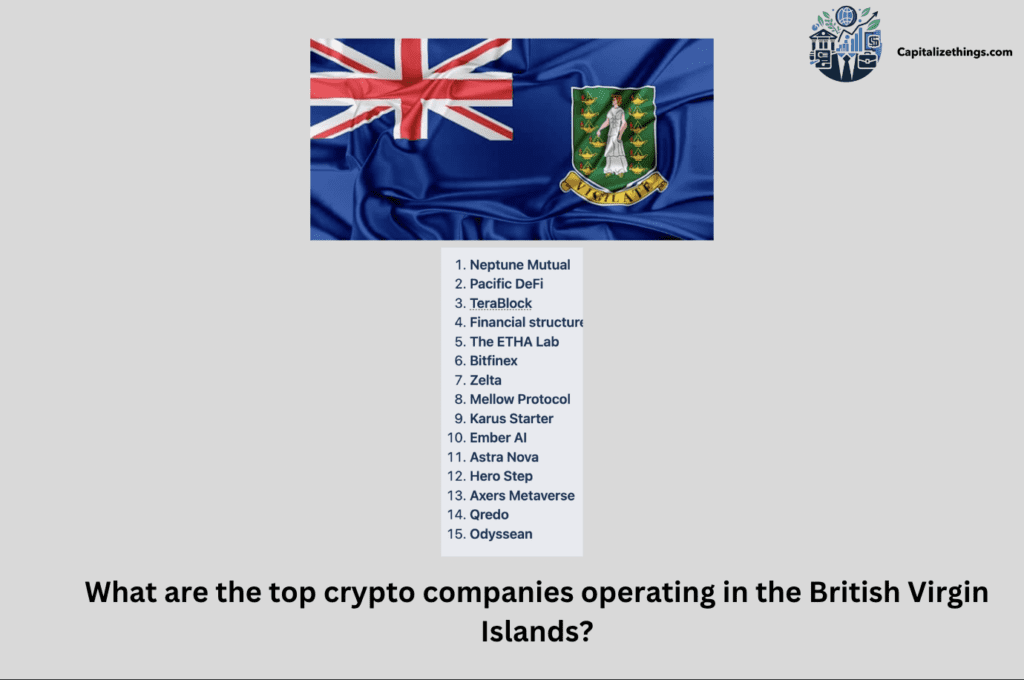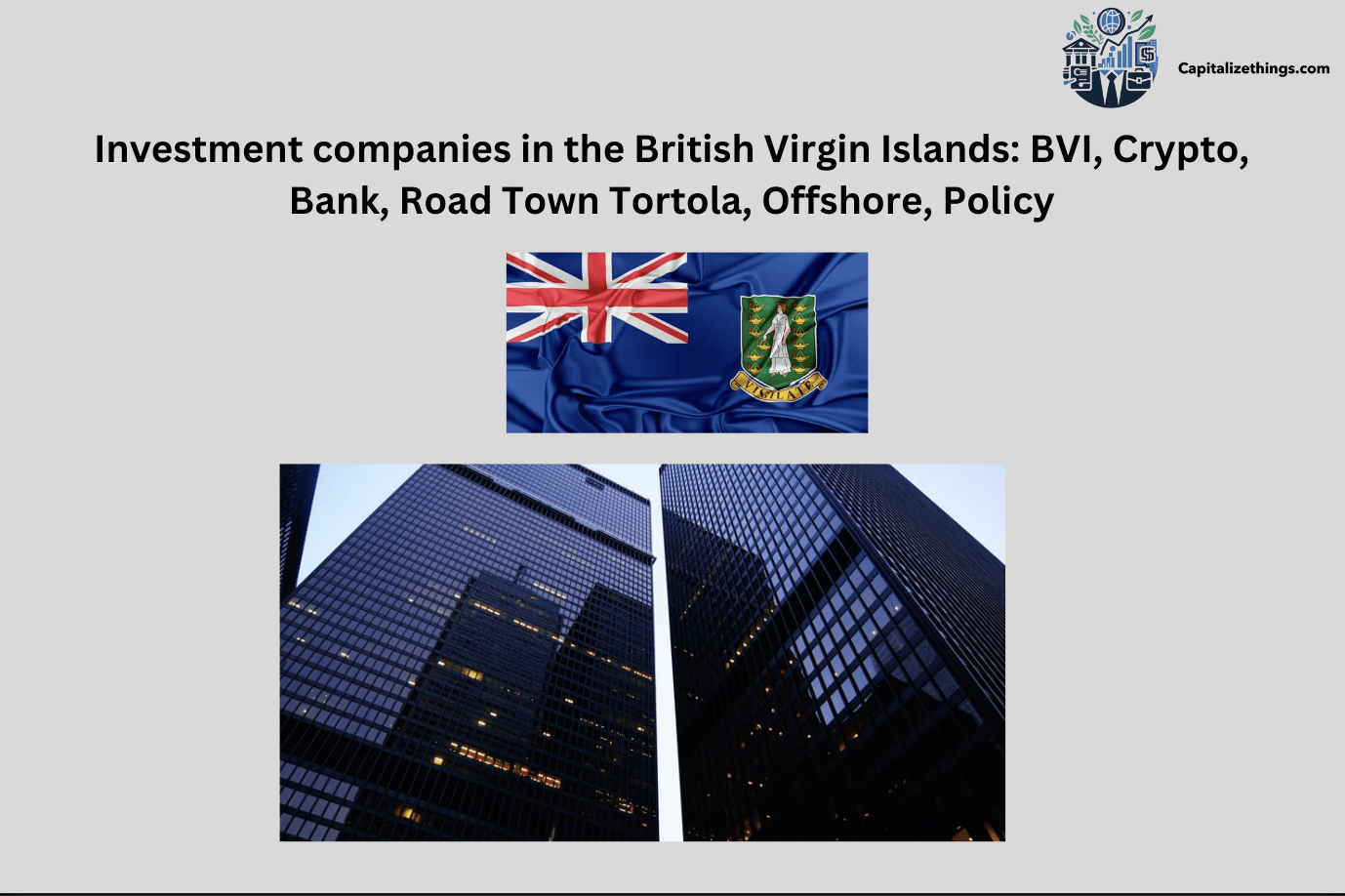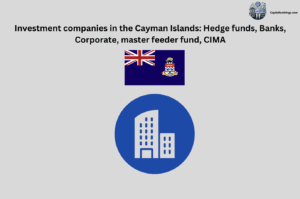Investment Company is the any issuer that invests, reinvests, or trades securities (Section 4. an of Republic Act No. 2629). An investment Company can be defined as a securities-issuing firm. These companies include mutual funds, unit investment trusts, and closed-end funds. Investment Business Division is considered an investment company in the British Virgin Islands.
The British Virgin Islands (BVI) is the second biggest offshore destination for hedge funds and a growing jurisdiction for offshore investment funds. Establishing investment advisers and managers in the BVI is cost-effective due to its flexibility in offering multiple regulatory regimes for modest to mid-sized hedge fund organizations. That is one of the many reasons the BVI is a top offshore hedge fund domicile. Holding business entities is a famous offshore business structure that allows investors to achieve significant returns in popular offshore destinations.
Cryptocurrencies are digital coins that can be exchanged via a computer network without a central authority like a government or Bank. Financially, it’s a separate asset class. Unlike commodities or equities, categories have not been legally defined, yet abstract versions exist. Neptune Mutual is one of the best crypto companies in BVI.
Investment banking handles complex financial transactions, including mergers and IPO underwriting. These banks can generate cash for companies by underwriting new securities for corporations, municipalities, and other institutions. They manage a company’s IPO and advise clients on acquisitions, mergers, and restructuring. VP Bank (BVI) Limited is an investment bank in the BVI. Hunter and Rawlinson, AMS Financial Group, and BVI Finance are in Road Town, Tortola.
Capitalize on BVI investment possibilities. At CapitalizeThings.com, we empower you with expert strategies for successful offshore investing.
What is an investment company in the British Virgin Islands?
An investment company in the British Virgin Islands (BVI) is a legal entity established to pool funds from investors and invest those funds in various assets, such as stocks, bonds, real estate, or other securities.
Considering a BVI investment company? CapitalizeThings.com (+1 (323) 456-9123) offers free 15-minute consultations to explore the BVI landscape with our experts!
What are the top investment companies in the British Virgin Islands?
Following are the 15 top Investment companies of the British Virgin Islands:
- LGL Trustees Limited
- Ogier
- Trident Trust
- Harneys Fiduciary
- Conyers
- Maples Group
- Mourant
- Appleby
- Estera
- HSM Group
- Intertrust
- BVI Finance
- Hunter and Rawlinson
- St. George’s Trust Company
- Liberty Trust Limited
Why are companies incorporated in the British Virgin Islands?
Companies are incorporated in the British Virgin Islands because it is a recognized offshore destination. Flexible corporation structuring, limited reporting deadlines, and a tax-efficient regime make BC a good business environment. As globalization advances, the BVI remains a top destination for investors seeking confidence and effectiveness in international trade.
Is the British Virgin Islands offering memorandum to business companies?
Yes! British Virgin Islands is offering memorandum to business companies. Investors receive an offering memorandum from an issuing business in exchange for their capital. The staff have written offering memorandum company papers for over 15 years. Many organizations in all major business hubs have used us to generate offering documents. Writing an offering memorandum (or “OM”) can constitute the difference between gaining finance and being ignored by investors. In addition to providing the company’s business plan, an OM will explain the offering’s securities features and terms. OM is a lengthy contract, with the subscription agreement at the end.
In the offering document, the management team’s skills and corporate risks will be discussed. List the business’s risk elements so investors can make informed decisions. Foreign investment legislation and investor tax implications will also be highlighted. The offering memorandum describes the company, its products and services, investment benefits, overtime payout and tactics, and more. It’s professional to give a prospect an investor-ready marketing memorandum.
How many businesses are in the Virgin Islands?
The US Virgin Islands has 2,320 businesses employing 25,652. 37% of employment was in establishments with less than twenty employees, and 34.6% in those with 20 to 99.
How many Virgin companies are there?
There are 40 Virgin companies in 35 different nations and 60,000 employees. Virgin Atlantic debuted in 1984 and expanded into transportation and leisure, media and telecommunication, entertainment and music, financial services, and wellness and health.
How many BVI companies are in the world?
There are 366,050 BVIcompanies in the world.
What is a professional investor in the BVI?
A professional investor is a person whose regular business involves selling or buying or buying property similar to the funds or an important section of its property.
What are the cons of BVI?
The disadvantages of BVI are:
- Servicing and audits can raise costs.
- KYC and compliance requirements increase.
- Offshore history creates reputational issues.
- Direct BVI business is limited.
Do BVI companies have annual returns?
Yes! BVI companies have annual returns. All BVI businesses must file an Annual Return by law. Some entities are excluded:
- Included companies include those stated on a stock exchange,
- Regulated by the Commission,
- Fling an annual tax return with the BVI Inland Revenue Department
- Those in liquidation, if the Annual Return was due before the liquidation.
How do I find a company in the BVI?
To find a company in the BVI, visit the BVI Commercial Registry. The BVI Commercial Registry gives information on British Virgin Islands firms. General company information includes registered office, status, registration number, incorporation date, and allowed capital. Searches cost a little and accept a variety of payment ways.
What are the two primary industries in the BVI?
Financial Services and Tourism are the two primary industries in the BVI.
Do BVI companies have share capital?
No! BVI companies don’t have share capital, which differs greatly from that in most offshore havens. Most offshore companies have no legal minimum for permitted capital. In BVI, the business company only needs to indicate the number of shares it will issue, so there is no minimum requirement. No minimum paid-up capital or deadline is required.
How do you set up a fund in BVI?
To set up a fund in the BVI, Remember the following guidelines: Approved BVI funds must have a BVI-resident, FSC-certified representative who submits all fund paperwork and fees. Custody and offering documents are optional. If not issued, a supplementary term sheet can carry investor warnings.
The following documents will be required:
- A written investor warning
- Constitutional documents
- Investment strategy details
- Payment of fees
- Offering documents can be needed.
- Complete an application.
- CVs for each director
- All beneficial owners, shareholders, and directors must submit professional references.
- Each beneficial owner, shareholder, and director needs a police certificate.
- Form A per director
Turn your BVI fund idea into action. CapitalizeThings.com (+1 (323) 456-9123) simplifies BVI fund setup with experienced professionals by your side.
What is the holding company in the BVI?
By definition, a holding company holds other corporations’ outstanding shares. The main goal is a corporate group; goods and services are not produced. The British Virgin Islands is a famous offshore business destination and investment platform for worldwide corporate investors. Establishing a BVI offshore corporation is simple. This guide covers the basics of holding company setup.
Who can certify documents in BVI?
A BVI Notary Public should certify your paper first. The document’s signatures and notary cover sheet will be verified.
What is the certificate of good standing of BVI Company?
The Registrar of Companies issues a Certificate of Good Standing to verify that a company legitimately exists, has met all administrative requirements for continued registration, and has submitted all government dues. The Certificate of Good Standing mimics the company’s Certificate of Incorporation. The Certificate of Good Standing (CGS) approves the legal continuation of an offshore corporation after registration. It verifies that the offshore company has yet to be merged, dissolved, or struck off.
Is there a public register of BVI companies?
Yes! There is a public register of BVI companies.
Why do people open BVI companies?
People open BVI companies because of the Financial Reporting and Tax Advantages. BVI Companies benefit from favourable corporation taxes. Offshore corporations incorporated here pay no income or dividend taxes, per international regulations. Financial statements are needed to be prepared but not filed publicly unless trading businesses are directly involved in regulated operations.
What is the minimum share capital of a BVI company?
A BVI company has no minimum share capital.
What is a BVI SPV?
A BVI special purpose vehicle (SPV) is a corporation formed to promote a parent firm. To open a BVI SPV business, investors must follow local incorporation processes and any regulations related to the SPV’s activity.
What are the top crypto companies operating in the British Virgin Islands?
The 15 top crypto companies operating in the British Virgin Islands are:
- Neptune Mutual
- Pacific DeFi
- TeraBlock
- Financial structure
- The ETHA Lab
- Bitfinex
- Zelta
- Mellow Protocol
- Karus Starter
- Ember AI
- Astra Nova
- Hero Step
- Axers Metaverse
- Qredo
- Odyssean
- Neptune Mutual
Neptune Mutual is Ethereum’s first parametric insurance protocol. It’s commonly known that no code is bug-free. Human mistakes are common in cryptocurrency exchanges, smart contracts, and digital asset custodians. Malicious actors are always looking for new weaknesses to exploit. Neptune Mutual is exploring new blockchain-based user-centric risk protection products.
- Pacific DeFi
Pacific DeFi is the creator of a decentralized crypto asset finance platform for security. It is simple to operate yield-enhancing vaults on many blockchains. The platform offers investors secure yield enhancement solutions for stablecoins and altcoins to achieve high-risk-adjusted returns.
- TeraBlock
TeraBlock streamlines transactions from 140+ fiats to any digital currencies on any blockchain with a widget, single flow, and SDK. Their Swidge protocol automates the procedure while combining Web2’s usability with Web3’s robustness. New and seasoned users can navigate DeFi without a learning curve.
- Financial structure
The financial structure was founded by MIT and Jump Trading alums and backed by Polychain Capital, making excellent financial markets accessible to everyone. The Structure app addresses an outdated economic system broken by waste and opacity by repackaging exclusive and non-participatory financial items into digital assets for the global public. Engineers, traders, designers, and innovators worldwide work remotely to solve global financial system problems.
- The ETHA Lab
ETHA Labs, a community-driven DeFi incubator, lowers institutional and retail consumers’ barriers to mass adoption. ETHA Lab (Build) builds crucial infrastructure and technology in DeFi, whereas ETHA Lab (Incubate) fosters fresh innovation and external DAO-based DeFi projects.
- Bitfinex
Bitfinex provides cutting-edge services for digital money traders and worldwide liquidity providers. Founded in 2012, it was one of the first major bitcoin trading platforms. The team has gathered vital experience and become the go-to platform for digital asset dealers and institutions. Bitfinex provides peer-to-peer lending, margin trading, an OTC market, and highly developed trading and charting tools.
- Zelta
Zelta is the next-gen Crypto Block Exchange. They have gamified Crypto Trading to keep you hooked! They have Crypto, NFTs, Vaults, and more in one location.
- Mellow Protocol
Mellow Protocol is a developer of a blockchain liquidity management ecosystem to reduce Defi market inefficiency and create profits. The company’s permission-less lockers platform incorporates liquidity management mathematical models in smart contracts for flexible liquidity provision and management.
- Karus Starter
KSM Starter is Kusama’s main launchpad for projects that want to build on the network and Substrate ecosystem. It is a community-driven platform. As long as projects choose to join the complex Kusama ecosystem, KSM Starter lets them raise funding. KSM Starter also allows developing initiatives to partner with professionals and established projects to build and deliver greater products to their communities.
- Ember AI
Ember manages your yield positions, assets, trades, and wallets in one straightforward place with an expert advisor. A cutting-edge cognitive computing architecture powers Ember AI’s LLM processing engine and multi-agent system for making decisions independently. Ember becomes a dynamic helper that meets your Bitcoin trading and DeFi management needs without the complexity.
- Astra Nova
Revolutionary web3 RPG Astra Nova was co-created with gamers for gamers. Using Hedera Hashgraph and Unreal Engine, Astra Nova combines cutting-edge technology, innovation, and agility for a tenth of the cost of AAA games while maintaining game quality. They guarantee an immersive and dynamic gameplay experience with AAA graphics, AI integration, and NFT features.
- Hero Step
Hero Step is the developer of a gaming place for high-quality play and profit. A fantasy-themed role-playing game with appealing gameplay, a cross-chained NFT marketplace, NFT collectibles, and tokens make the company’s ecosystem a great place to play and make money.
- Axers Metaverse
Global top-4 mobile game publisher Azur Games developed the blockchain game Axes Metaverse. They saw the play-to-earn market’s potential and accepted the challenge by turning their existing game axes.io, which has 30M+ installs on Android and iOS, into Axes Metaverse, the blockchain version. They have the most potential for GameFi projects because they are supported by a game dev firm with 2B+ installs and will bridge the P2E market for non-crypto players.
- Qredo
Using an open protocol, Qredo helps institutional traders safeguard and speed digital asset transfers 24/7. The Qredo Network lets institutional traders join a safe network that removes exchange wallet pre-funding & counterparty risk when moving and transferring cryptocurrencies and other tokenized assets. Qredo Network provides leading security for businesses on a regulator-ready infrastructure.
- Odyssean
Odyssean is a market maker, market-neutral exclusive trading firm and Digital asset manager, focusing on low-latency crypto asset and derivatives execution. Its bespoke trading platform links 100+ order books.

What are the Recognised stock exchanges in the BVI?
Following 3 are the Recognised stock exchanges in the BVI:
- The Tokyo
- The London Stock Exchange,
- The New York
What are the top Investment banks in the British Virgin Islands?
The top 7 Investment banks in the British Virgin Islands are:
- VP Bank (BVI) Limited
- National Bank of Virgin Islands
- Scotiabank (British Virgin Islands) Limited
- Banco Popular de Puerto Rico
- First Bank VI
- Bank of Asia (BVI) Ltd
- First Caribbean International Bank
- VP Bank (BVI) Limited
VP Bank (BVI) Limited is a famous British Virgin Islands commercial bank. This Bank was founded in 1956, quite some time ago. This Bank is headquartered in Tortola. About 800 people work there to serve local clients. By 2020, This Bank accumulated $13.5 billion in assets. In the same year, this Bank got $41.6 million. VP Bank Group owns VP Bank (BVI) Ltd. VP Bank Group is a most important Liechtenstein bank. This group is enormous in Switzerland, Luxembourg, Singapore, Russia, Hong Kong and the British Virgin Islands. This Bank specializes in managing assets and private banking.
- National Bank of Virgin Islands
The National Bank of Virgin Islands is one of the largest commercial banks in the British Virgin Islands. This Bank opened in 1974. Previously, it was the Development Bank of the Virgin Islands Limited. The Companies Act, Cap. 285 incorporated it in the British Virgin Islands. The Development Bank of the Virgin Islands became the National Bank on February 28, 2007. After 2007, the Bank’s approach altered as it switched from development to commercial banking. The British Virgin Islands government owns this Bank. Local farmers and fishermen receive financing. It provides retail banking services and local corporate as a full-service commercial bank.
- Scotiabank (British Virgin Islands) Limited
Scotiabank is a Bank of Nova Scotia subsidiary. The Bank of Nova Scotia is a significant Latin American, Central American, Caribbean, and North American bank. British Virgin Islands-based Scotiabank has its headquarters on Tortola. This subsidiary bank offers several financial services, including retail, private, corporate, and wealth management (5). This Bank has $914 billion in assets at the end of 2016. In the same year, this financial institution earned $7213 million.
- Banco Popular de Puerto Rico
Banco Popular de Puerto Rico is among the oldest banks. The British Virgin Islands’ main Bank is 100 years old and is headquartered in Tortola. The bank serves British Virgin Islands, Puerto Rico, and US consumers. Its clients include legal entities, financial institutions, and individuals. The Bank offers business, retail, and fiduciary services to local and international clients. By the end of 2020, it had $65.9 billion in assets, and in the same year, it earned $506.6 million.
- First Bank VI
First Bank VI is a British Virgin Islands bank created in 1984. Location of First Bank VI’s headquartersThis British Virgin Islands bank was created in 1984. First Bank VI is headquartered in Tortola. First Bank VI services Puerto Rican and American customers and British Virgin Islanders. It provides many goods and services, including commercial banking, insurance, and retail banking. The Bank has $118.50 billion in assets by the end of 2020. In the same year, this Bank earned $102.07 million.
- Bank of Asia (BVI) Ltd
Bank of East Asia Ltd.’s subsidiary is East Asia Financial Holding (BVI) Ltd. Established in 2008, it’s nine years old. The 2009 acquisition of ATC Trustees Limited and Caribbean Corporate Services Limited created East Asia Financial Holding (BVI).
- First Caribbean International Bank
First Caribbean International Bank is another significant British Virgin Islands commercial top bank. This Bank is a First Caribbean International Bank affiliate. It started in 2001, 16 years ago. Georgetown houses this Bank’s headquarters. The Bank employs 2700 employees, which is significant for the British Virgin Islands. The Bank has $18.79 billion in assets at the end of 2020. In the same year, this Bank earned $102.3 million. It serves 17 regional markets with 7 offices, 22 banking centers, and 59 branches. It offers retail, investment, treasury, wealth management, corporate, and sales & trade services as a commercial bank.
Which bank account is best for BVI Company?
Belize Banks, Heritage Bank, Caye International Bank Ltd, and Mauritius Commercial Bank are good offshore banks for opening and managing accounts without traveling for a BVI company.
What are the companies in Road Town Tortola?
Trident Trust Company Limited, Harneys, Ogier, Appleby, Maples and Calder, Mourant Ozannes, Walkers and Estera, Conyers Dill & Pearman, and Intertrust are situated in Road Town Tortola.
What are the offshore companies in the British Virgin Islands?
Fidesta Ltd. provides regulated offshore incorporation. They form BVI Business Companies for overseas clientele in the British Virgin Islands. They provide excellent service, fast turnaround, and competitive pricing.
What is the policy for investment companies in the British Virgin Islands?
The British Virgin Islands company law governs enterprises registered there. It is approved by the BVI Business Companies Act of 2004 and reduced by the Insolvency Act of 2003 and the Commodities and Investment Business Act of 2010. At 30, the British Virgin Islands could have the highest company-to-population ratio in the world. The British Virgin Islands have less taxation since company registration fees comprise a large part of government revenue. This could explain why the British Virgin Islands have more corporation legislation than other countries.
What is the International Business Companies Act of the British Virgin Islands?
British Virgin Islands law allowed IBCs to be incorporated under the International Business Companies Act of 1984. The Act heavily influenced the Territory’s 1990s fiscal and economic growth. The Act prohibited companies from doing business with British Virgin Islands residents (i.e., it was for international business) in exchange for exemption from all British Virgin Islands taxes and stamp duties.
Who are the British Virgin Islands owned by?
The British Virgin Islands are owned overseas. The BVI are a British Foreign Territory. The 2007 constitution increased internal self-government. The governor—appointed by the British monarch—is the CEO. Premiers are elected by the majority party in the House of Assembly (previously the Legislative Council) and approved by the governor. The premier leads a cabinet of four ministries and the ex-attorney general.
Education is free and mandatory for children between the ages of 5 and 13. The islands include various colleges, notably H. Lavity Stoutt Community College (formerly British Virgin Islands Community College), which began in 1990.
Why do hedge funds use the Cayman Islands?
Hedge funds use the Cayman Islands due to law jurisdiction. With legal expertise in Europe, North America, and Asia, the Cayman Islands can readily recruit hedge funds. The ordinary law jurisdiction is well-known. Cayman Islands hedge funds are companies, limited partnerships, or unit trusts that a global management body can administer. Since no domicile requirement exists, most Cayman fund managers do not maintain a presence there.
Why do investors invest in the Cayman Islands?
Investors invest in the Cayman Islands due to its stable economy, favourable tax policies, and burgeoning real estate market. The Cayman Islands provide investors with an exceptional opportunity to capitalize on international purchasers’ growing interest and diversify their portfolios.
Thanks to the legal system, foreign investors can own land in the Cayman Islands. Clear and open real estate rules give investors confidence in their investments and strong legal protections. No income, inheritance, capital gains, or property taxes apply in the Cayman Islands. This favorable tax climate and the lack of foreign property ownership limitations make investing in the Cayman Islands land easy and profitable.
Capitalize on Cayman Islands investment opportunities. CapitalizeThings.com (+1 (323) 456-9123) book your free consultation right away and let our experts help you.
What is the difference between BVI and the Cayman fund?
The difference between BVI and Cayman funds is in market practices and costs. Due to an early-mover advantage, the Cayman Islands are the world’s top offshore jurisdiction for established investment funds and publicly traded businesses. At the same time, the BVI is preferred by startups and holding businesses due to lower incorporation and annual maintenance fees.
The flexibility of BVI legislation has made it a preferred domicile for cryptocurrency trading organizations, non-fungible token issuers, and various other digital asset businesses. Both governments officially regulate digital asset service providers, but their approaches differ, so consumers should obtain legal guidance to choose the best country.
What is the difference between investment banking and asset management?
Investment banking helps companies raise finance. Investment banks offer M&A advice, equity and debt issuance, and strategic financial guidance. Asset management allows clients reach financial goals by managing their investment portfolios. They do wealth accumulation or income generation.
What is the difference between investment banking and private equity?
The difference between investment banking and private equity is that the Private equity is a career. Generally, non-public enterprises use this sort of financing. Angel investors, private investors and Venture capital companies, can do this. When we say we want to work in private equity, we imply we want to work for a venture capital and investment firm that invests in private companies.
Investment banking supplies financial services to corporations, governments, and other institutions. Examples include underwriting equity, handling M&As and granting loans. It usually entails helping private companies raise equity via an IPO.
Private equity firms are more practical than investment banks. They usually invest their own money in a company. Investment banks are primarily hired to provide financial services. Both sorts of corporations teach you how they work and make money. Depending on your function, you will get operational knowledge at a private equity company. Investment banking can be better if you love looking at firms through the perspective of investments and money. When helping a firm issue financing or shares, investment banks must evaluate its cash flows, risk profile, and valuation.
What is the difference between investment banking and hedge funds?
The difference between investment banking and hedge funds is given below:
| Investment banking | Hedge funds |
| Help firms raise funds.Acquisition and merger advice.Price/commission income.Sound returns, low risk. | Manage investor funds.Try unstable tactics for high returns.More capacity profits/losses. |
What is the difference between investment banking and venture capital?
The major difference between investment banking and venture capital is that venture capital, a private equity, is a typical means for start-ups to raise funds and become profitable. A group of entrepreneurs, usually under a firm, invest in a young, growing company. Venture financiers choose companies with high growth potential. They hope the company will develop short- and long-term, generating significant profit.
Investment bankers advise corporations seeking finance or restructuring. They recruit partners and groups to help clients close transactions. Private equity firms seeking an exit strategy can get assistance from an investment banker.
What is the difference between investment banking and commercial banking?
The difference between investment banking and commercial banking is that the commercial banking serves consumers and small —to medium-sized enterprises. Its main duties are monitoring customer bank accounts and offering loans and financial advice. Profit comes from transaction fees, service charges, and loan interest.
Investment banks handle significant project finance for firms and entrepreneurs. This could involve acquisitions and mergers, stock recommendations, or project financing. Investment banking should be divided into securities trading and financial advisory. Fungible trading securities can raise trading capital. Investment banks buy and sell these securities at a profit after underwriting them.
Can a beginner investor open an investment company quickly in the British Virgin Islands?
Yes! A beginner investor can easily open an investment company in the British Virgin Islands. Your firm can be started without a lot of money or patience. Company registration can be done remote in a few days. Directors need not be British Virgin Islands residents. The amount of approved capital is also unregulated.
Does an Investor company in the British Virgin Islands pay taxes?
No! Investor Company in the British Virgin Islands does not pay taxes.
Can a company from the US invest in the British Virgin Islands?
Yes! A company from the US can invest in the British Virgin Islands.
Conclusion
Investment companies are financial institutions that accumulate, manage, and invest securities. The Exchange and Securities Commission regulates and registers these US corporations under the Investment Company Act 1940. Investment firms invest money for clients who share both gains and losses. An investment company of the British Virgin Islands is the Investment Business Division.
The Virgin Islands (BVI) are a British Overseas Territory in the Caribbean, eastern of the US Virgin Islands, Puerto Rico, and north-west of Anguilla. They are part of the Virgin Islands archipelago in the West Indies and the Leeward Islands of the Lesser Antilles. The British Virgin Islands include Tortola, Anegada, Jost Van Dyke, Virgin Gorda, and over fifty additional islands and cays. About 16 islands are populated.
A digital ledger uses strong cryptography to safeguard transaction records, govern coin generation, and verify coin ownership transfers. Many fungible blockchain tokens have been called cryptocurrencies, but they are not currencies in the traditional sense. In various jurisdictions, they have been classified as securities, commodities, and currencies. Financial Structure is one of the good crypto companies in BVI.
Investment banks underwrite and sell debt and equity securities for all types of firms, help with acquisitions and mergers, modifications, and broker transactions for institutions and individual investors. Issuers receive stock offering and placement advice from investment banks. Scotiabank (British Virgin Islands) Limited is an investment bank in BVI. TMF Group and HLB Internationalare investment companies in Road Town Tortola.

Larry Frank is an accomplished financial analyst with over a decade of expertise in the finance sector. He holds a Master’s degree in Financial Economics from Johns Hopkins University and specializes in investment strategies, portfolio optimization, and market analytics. Renowned for his adept financial modeling and acute understanding of economic patterns, John provides invaluable insights to individual investors and corporations alike. His authoritative voice in financial publications underscores his status as a distinguished thought leader in the industry.







